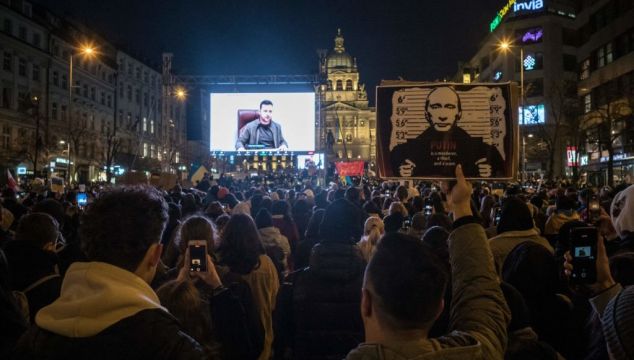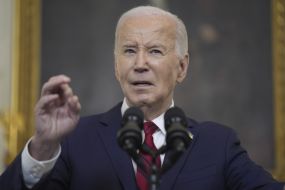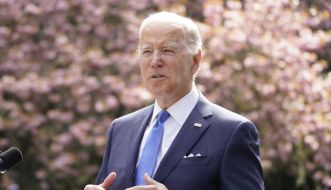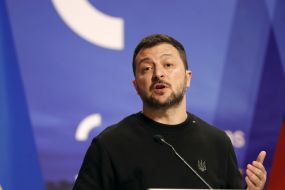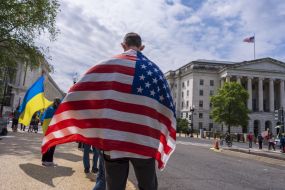What you need to know right now
- Russian forces seized Europe's biggest nuclear power plant on Friday in heavy fighting in southeastern Ukraine, triggering global alarm, but a huge blaze in a training building has been extinguished and officials said the facility was now safe.
- No damage was done to the reactors at the Zaporozhzhia plant after a projectile hit a nearby building on the site, UN nuclear chief Rafael Grossi said. He thought the projectile was Russian. Russia's defence ministry blamed the attack on Ukrainian saboteurs.
- The eastern Black Sea port of Mariupol is without water and heating and food is scarce, its mayor said, appealing for military help. "We are simply being destroyed," he said.
- Ukraine says it has halted an advance by Russian troops into the port of Mykolayiv. The city's mayor reported fighting there as Russian forces entered.
- Russian forces also bombarded Ukraine's capital Kyiv and surrounded several other cities. More than a dozen explosions were heard in Kyiv and air raid sirens wailed.
- Russia blocked access to Facebook, accusing it of restricting access to Russian media on the platform.
- Britain's BBC said it would temporarily suspend the work of all its journalists and support staff in Russia after the introduction of a new law that could jail anybody found to be intentionally spreading "fake" news.
- Nato allies rejected Ukraine's demand for no-fly zones, saying such a direct intervention would lead to an even more brutal war, but EU countries - many of them also in Nato - said they were weighing more sanctions on Russia.
- The UN Human Rights Council overwhelmingly backed a resolution condemning alleged rights violations by Russia in Ukraine and setting up a commission to investigate them.
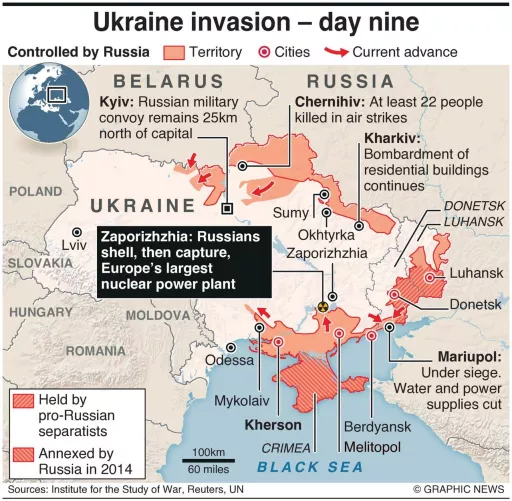
10.15pm: Major news channels CNN, Bloomberg News and the Canadian Broadcasting Corp (CBC) have followed the BBC in temporarily suspending reporting from the ground in Russia, citing a new law that could mean jail for those found to be intentionally spreading "fake" news.
"CNN will stop broadcasting in Russia while we continue to evaluate the situation and our next steps moving forward," a CNN spokesperson said.
"The change to the criminal code, which seems designed to turn any independent reporter into a criminal purely by association, makes it impossible to continue any semblance of normal journalism inside the country," Bloomberg Editor-in-Chief John Micklethwait said.
"The CBC is very concerned about new legislation passed in Russia, which appears to criminalize independent reporting on the current situation in Ukraine and Russia," CBC said.
Bloomberg News will temporarily suspend the work of its journalists inside Russia after President Vladimir Putin signed legislation that criminalizes independent reporting in the country https://t.co/N5XMI7o6vn
Advertisement— Bloomberg (@business) March 4, 2022
9.45pm: French luxury group LVMH will "temporarily" close its 124 stores in Russia from Sunday, a group spokesperson told Reuters on Friday. The announcement follows similar moves earlier in the day by Birkin bag maker Hermes and Cartier owner Richemont, who were the first major global luxury firms to pause all commercial activities in the country.
9.30pm: A broad bipartisan majority of Americans think the United States should stop buying Russian oil and gas and work with Nato to set up "no-fly zones" to protect Ukraine from Russian air strikes, according to a Reuters/Ipsos poll completed on Friday.
The poll, conducted Thursday and Friday, suggests that US outrage is growing over Russia's invasion of Ukraine, which in recent days has increasingly involved Russian bombing of urban areas.
Exclusive: A broad bipartisan majority of Americans think the U.S. should stop buying Russian oil and gas and work with NATO to set up 'no-fly zones' to protect Ukraine from Russian air strikes, according to a Reuters/Ipsos poll completed https://t.co/pP4FKuG2T2 pic.twitter.com/4qUQwRscWM
— Reuters (@Reuters) March 4, 2022
9.20pm: Former US vice president Mike Pence will urge Republicans to move on from the 2020 election and declare “there is no room in this party for apologists for Putin” as he escalates his break from former president Donald Trump.
9.00pm: Russian state communications regulator Roskomnadzor has restricted access to Twitter Inc, Tass news agency said on Friday. Interfax news agency earlier said the service had been blocked. Earlier on Friday the regulator said it had blocked Meta Platforms Inc's Facebook in response to what it said were restrictions of access to Russian media on its platform.
8.42pm: Ukrainian President Volodymyr Zelenskiy has called on European nations to support his country’s fight against the invading Russian military. Zelenskiy appeared on video as he addressed thousands of people protesting against the war in several European cities – naming among them Paris, Prague, Lyon and Frankfurt.
"If we win, and I’m sure we’ll win, this will be the victory of the whole democratic world, this will be the victory of our freedom, this will be the victory of light over darkness," he said.
8.23pm: Russia has blocked access to Facebook for its 146 million citizens amid the Ukraine invasion, a state regulator has said. The country’s communications watchdog, Roskomnadzor, said the social media platform was blocked on day nine of the war due to “cases of discrimination against Russian media”. It comes a week after Russia limited access to Facebook after it refused to stop fact-checking and labelling content from state-owned organisations.
7.45pm: "Russia has never been so isolated, we have never been more united," US Secretary of State Antony Blinken said after meeting with his EU counterparts over Moscow's war against Ukraine. The United States will continue to increase the costs on Russia, he said.
"Tens of millions of Russians will suffer because of the dangerous decisions made by a tiny circle of corrupt leaders and cronies. Unless the Kremlin changes course it will continue down the road of increasing isolation and economic pain," he told a news conference.
U.S. Secretary of State Antony Blinken says Putin’s actions in Ukraine are ‘relevant to the entire world’ and warns Russia's invasion threatens fundamental principles established after two world wars that are important to keeping peace and security https://t.co/YzOVw4TzXE pic.twitter.com/54loZXvVrJ
— Reuters (@Reuters) March 4, 2022
7.30pm: A Ukrainian MP has said singing the national anthem in the nation’s parliament on Thursday sent a message to the world that “we’re not leaving”. Hundreds of MPs sang the anthem, which translates in English as “Glory and Freedom of Ukraine has not yet Perished.”
7.05pm: Accounts are emerging of Asian and African students being pulled off trains, held up at borders and pushed to the back of long lines as they attempt to flee Ukraine. Nigerian medical student Oduola Adebowale said he and some friends were trying to get on a train when soldiers pointed guns at them and ordered them back.
6.30pm: The world narrowly averted a nuclear catastrophe overnight when a fire broke out during a Russian seizure of the Zaporizhzhia nuclear power plant in Ukraine, the US Ambassador to the United Nations said, and demanded assurances from Moscow that such an assault will not happen again.
Speaking at an emergency meeting of the UN Security Council, Linda Thomas-Greenfield warned that "imminent danger" persisted, citing Russian troops whom she said were 32 kilometres from Ukraine's second-largest nuclear facility.
‘The world narrowly averted a nuclear catastrophe last night,’ Linda Thomas-Greenfield, U.S. Ambassador to the U.N. tells the 15-member Security Council, convened following the seizure of the Zaporizhzhia nuclear power in Ukraine by Russian troops https://t.co/WrsS7FcWwG pic.twitter.com/wYO72LW8O3
— Reuters (@Reuters) March 4, 2022
6.15pm: Ireland is “hostile to Russia and everything Russian,” Russian ambassador to Ireland Yury Filatov told a Russian state-owned television station. Mr Filatov accused the country of being at the forefront of “anti-Russian events” in the European Union. He said protesters had been “really aggressive” at the country’s embassy in Dublin and said some Russian children faced bullying.
6.00pm: Heavy fighting to the north-west of the Ukrainian capital Kyiv has continued Friday, highly likely including renewed fighting around Hostomel Airfield, Britain said in an intelligence update. "This is near the front end of the Russian column on the outskirts of the city. The column has made little discernible progress in over four days."
Latest Defence Intelligence update on the situation in Ukraine - 04 March 2022
Find out more about the UK government's response: https://t.co/94E5eElOTW
🇺🇦 #StandWithUkraine 🇺🇦 pic.twitter.com/txyA9fOgc9— Ministry of Defence 🇬🇧 (@DefenceHQ) March 4, 2022
5.45pm: The Taoiseach has said Ireland will have to “reflect” on its longstanding policy of military neutrality in future European conflicts, as Russia’s invasion of Ukraine escalated with an attack on a nuclear power station in Zaporizhzhia.
Micheál Martin said Ireland is “facilitating” the European Peace Facility, which, he noted, was for the first time deploying “lethal weapons” to Ukraine to defend the country against Russian soldiers.
5.30pm: Military operations around nuclear sites and other critical civilian infrastructure are "unacceptable" and "highly irresponsible", UN political affairs chief Rosemary DiCarlo told the Security Council of the United Nations on Friday.
"Attacks on nuclear power facilities are contrary to international humanitarian law... Every effort should be taken to avoid a catastrophic nuclear incident," Di Carlo told an emergency meeting of the UN Security Council after Russian forces in Ukraine attacked and seized Europe's biggest nuclear power plant.
5.00pm: Britain's BBC said it would temporarily suspend the work of all its journalists and support staff in Russia following the introduction of a new law that could jail anyone found to be intentionally spreading "fake" news.
Tim Davie, the director general of the BBC, said in a statement the legislation appeared to criminalise the process of independent journalism.
"It leaves us no other option than to temporarily suspend the work of all BBC News journalists and their support staff within the Russian Federation while we assess the full implications of this unwelcome development," he said.
BBC statement on reporting from within Russia.
Reacting to new legislation passed by the Russian authorities, BBC Director-General Tim Davie says: pic.twitter.com/uhowHW3jkr— BBC Press Office (@bbcpress) March 4, 2022
4.45pm: A Russian air strike on a rural residential area in Kyiv region killed at least seven people on Friday, including two children, Ukraine state police said in a statement. Police said the strike hit the village of Markhalivka, around 10 kilometres from the southwestern outskirts of the capital.
4.30pm: Russian President Vladimir Putin told German Chancellor Olaf Scholz he hoped Ukraine would take a "reasonable and constructive" position during the next round of talks, the Kremlin said in a statement.
Putin also told Scholz by phone that Russia was open for dialogue with Ukraine on condition that all its demands are met. Russia and Ukraine have held two rounds of talks since Russia invaded, and have so far reached an understanding on the need to open up humanitarian corridors.
4.20pm: Ukraine still has a "significant majority" of its military aircraft available nine days after Russian forces started their invasion of the country, a US defence official said on Friday.
"The Ukrainians still have a significant majority of their air combat power available to them, both fixed wing and rotary wing as well as unmanned systems and surface to air systems," the official, speaking on the condition of anonymity, said.
4.15pm: Russian forces were driven out of the Ukrainian city of Mykolayiv after attacking it on Friday but fighting continued around the city outskirts, regional governor Vitaliy Kim said.
4.10pm: France has activated the crisis centre of its ASN nuclear watchdog after a fire at the Zaporizhzhia nuclear plant in Ukraine broke out, using the country's expertise in nuclear radiation to monitor developments amid intense fighting around the plant.
French energy minister Barbara Pompili said no changes regarding radiation levels had been signalled. "That's rather reassuring," she told Franceinfo radio. "But these very sensitive facilities need to be shielded."
3.55pm: The party coalition governing Latvia's capital Riga agreed to change the name of the street where Russia's embassy is located to Independent Ukraine Street, a statement said. The move followed an announcement on Thursday that Vilnius in neighbouring Lithuania will change the name of a street where the Russian embassy is located to Heroes of Ukraine Street.
3.44pm: The Ukrainian city of Mariupol has no water, heat or electricity and is running out of food after coming under attack by Russian forces for the past five days, its mayor said on Friday.
Mayor Vadym Boychenko made a televised appeal for military help and said a humanitarian corridor should be created to evacuate civilians from the southeastern port city. "We are simply being destroyed," he said.
The south-eastern port city of Mariupol remains under Ukrainian control but it has been encircled by Russian forces and subjected to intense strikes, Britain said in an intelligence update https://t.co/Q7ykyn3g8z pic.twitter.com/PXMUq0olq6
— Reuters (@Reuters) March 4, 2022
3.20pm: Washington is committed to doing everything needed to stop the war in Ukraine, US Secretary of State Antony Blinken said on Friday as he went into a meeting with his EU counterparts praising the bloc for the "historic" steps it has taken against Russia.
"We are faced together with what is President Putin's war of choice: unprovoked, unjustified, and a war that is having horrific, horrific consequences for real people. For mothers, fathers. For children. We see the images on TV, and it has to stop," he told reporters in Brussels.
3.02pm: "This is Putin's war, and Putin has to stop this war," the EU's foreign policy chief said. Josep Borrell called on Russian President Vladimir Putin to stop indiscriminate shelling and bombing of Ukraine, ahead of a meeting of EU and other foreign ministers to discuss the crisis.
German Foreign Minister Annalena Baerbock meanwhile said Russian forces in Ukraine are increasingly targeting the civilian population. "It is clear to see that this war of aggression by Putin is targeting the civilian population with the most brutal rigour."
LIVE: HR/VP @JosepBorrellF and U.S. Secretary of State @SecBlinken
remarks ahead of today's Extraordinary #FAC. https://t.co/TsJOPajAo6— European External Action Service - EEAS 🇪🇺 (@eu_eeas) March 4, 2022
2.45pm: The US Embassy in Ukraine said that attacking a nuclear power plant is a war crime on Friday, after Russia seized a Ukrainian nuclear facility that is the biggest in Europe. The statement on the embassy's Twitter account went further than any US characterisation of Russia's actions in Ukraine.
"It is a war crime to attack a nuclear power plant. Putin's shelling of Europe's largest nuclear plant takes his reign of terror one step further," US Embassy Kyiv said in its post.
On Wednesday, US President Joe Biden stopped short of calling Russia's actions war crimes, saying, "It's too early to say that."
It is a war crime to attack a nuclear power plant. Putin's shelling of Europe's largest nuclear plant takes his reign of terror one step further. #TheHague #Zaporizhzhia #StandwithUkraine
— U.S. Embassy Kyiv (@USEmbassyKyiv) March 4, 2022
2.30pm: The European Union wants Ukraine to become a member state "as soon as possible", Commissioner Maros Sefcovic told journalists on Friday after a ministers' meeting.
"It's time for signalling that the Ukrainian people is one of the European peoples and we want them in as soon as possible", he said, but added that the bloc needed to focus on short-term measures linked to the war. "I think what... is the most important now is to help Ukraine in the fight."
2.20pm: The UN human rights office said on Friday it had confirmed 331 civilians have been killed and 675 injured in Ukraine since Russia's invasion began on February 24th, adding that the real toll was likely much higher. Among the 331 killed were 19 children.
Most of the victims were killed by explosive weapons such as shelling from heavy artillery, multi-launch rocket systems and missile and air strikes, according to the rights office, which has monitors in Ukraine.
2.15pm: The United Nations Security Council will hold an emergency meeting on Friday at 4.30pm Irish time following Russia's attack on Zaporizhzhia nuclear power plant in Ukraine, diplomats said.
Russian invasion forces seized Europe's biggest nuclear power plant on Friday in heavy fighting in southeastern Ukraine, triggering global alarm, but a huge blaze in a training building has been extinguished and officials said the facility was now safe.
1.05pm: The war in Ukraine will cause more deaths and destruction over the coming days, Nato Secretary-General Jens Stoltenberg said on Friday, calling on Russia's President Vladimir Putin to withdraw all troops from Ukraine without conditions.
"The days to come are likely to be worse, with more deaths, more suffering and more destruction," Stoltenberg told reporters after a meeting of the alliance's foreign ministers in Brussels.
12.50pm: Ukraine's Black Sea port city of Mykolayiv issued an air raid warning on Friday after the authorities reported fighting around the city as Russian forces sought to advance.
Earlier on Friday, the Ukrainian authorities said the Russian advance on the ship-building hub had been halted after Regional Governor Vitaliy Kim reported Russian troops entering the city.
10.20am: Russia's defence ministry on Friday blamed an attack at the site of the Zaporizhzhia nuclear power plant in Ukraine on Ukrainian saboteurs, calling it a "monstrous provocation".
Ukraine has said Russian forces attacked the plant in the early hours of Friday, setting an adjacent five-storey training facility on fire, in an incident that provoked international condemnation of Moscow, eight days into its invasion of Ukraine.
Reuters could not independently verify either the Russian or the Ukrainian account of the incident.
A Russian defence ministry spokesman said the nuclear plant was operating normally and the area had been under Russian control since February 28th.
"However, last night on the territory adjacent to the power plant, an attempt was made by the Kyiv nationalist regime to carry out a monstrous provocation," spokesman Igor Konashenkov said.
"On March 4 at about 2am during a patrol of guarded territory adjacent to the Zaporozhye nuclear power plant, a mobile patrol of the National Guard came under attack from a Ukrainian sabotage group.
"To provoke return fire on the building, heavy small arms fire was opened on Russian National Guard servicemen from the windows of several floors of a training complex located outside the power plant."
He said the Russian patrol returned fire to suppress the attack, and the "sabotage group" abandoned the training complex, setting fire to it as they left.
The account was diametrically opposed to Ukraine's version of events.
Earlier, a video from the plant verified by Reuters showed a building aflame, and a volley of incoming shells, before a large incandescent ball lit up the sky, exploding beside a car park and sending smoke billowing across the compound.
Continued dialogue with 🇯🇵 PM @kishida230. Informed about Russia's nuclear terrorism at the Zaporizhzhia #NPP. We both agree on the gravity of threats to global security. Thanked 🇯🇵 for the diverse assistance to 🇺🇦 & the sanctions pressure on RF. Together we oppose the aggressor
— Володимир Зеленський (@ZelenskyyUa) March 4, 2022
8.50am European Union's top diplomat Josep Borrell said on Friday that all options remained on the table about new sanctions against Russia for its invasion of Ukraine. "We will consider everything," Borrell told reporters when asked about new sanctions, and specifically about the possible suspension of the EU's gas imports from Russia.
"Everything remains on the table," he added on his arrival to a meeting of Nato foreign ministers in Brussels.
6.50am Footage shot at night showed one building aflame, and a volley of incoming shells, before a large candescent ball lit up the sky, exploding beside a car park and sending smoke billowing across the compound. It was not immediately clear who was in control of the plant.
"Europeans, please wake up. Tell your politicians – Russian troops are shooting at a nuclear power plant in Ukraine," Ukrainian leader Volodymyr Zelenskiy said in a video address.
Zelenskiy said Russian tanks had shot at the nuclear reactor plants, though there was no evidence cited that they had been hit.
The mayor of the nearby town of Energodar about 550 km (342 miles) southeast of Kyiv said fierce fighting and "continuous enemy shelling" had caused casualties in the area, without providing details.
Thousands of people are believed to have been killed or wounded and more than 1 million refugees have fled Ukraine since Russian President Vladimir Putin last Thursday launched the biggest attack on a European state since World War Two.
Chernobyl plant
Russia has already captured the defunct Chernobyl plant, about 100 km north of Kyiv, which spewed radioactive waste over much of Europe when it melted down in 1986. The Zaporizhzhia plant is a different and safer type, some analysts said.
US President Joe Biden and UK Prime Minister Boris Johnson both spoke with Zelenskiy to get an update on the situation at the plant.
"President Biden joined President Zelenskiy in urging Russia to cease its military activities in the area and allow firefighters and emergency responders to access the site," the White House said.
Johnson said Russian forces must immediately quit their attack and agreed with Zelenskiy that a ceasefire was crucial.
"The prime minister said the reckless actions of President Putin could now directly threaten the safety of all of Europe," Downing Street said.
Energy Secretary Granholm said on Twitter the reactors at Zaporizhzhia were "protected by robust containment structures" and were being "safely shut down".
The head of the International Atomic Energy Agency said he was "deeply concerned" with the situation at the power plant and was in contact with Ukrainian authorities.
On Thursday, Russia and Ukraine negotiators agreed to the need for humanitarian corridors to help civilians escape and to deliver medicines and food to the areas where fighting was the fiercest.
Ukrainian presidential adviser Mykhailo Podolyak said a temporary halt to fighting in select locations was also possible.
The negotiators will meet again next week, the Belarusian state news agency Belta quoted Podolyak as saying.
Fallen city
Only one Ukrainian city, the southern port of Kherson, has fallen to Russian forces since the invasion was launched on February 24th, but Russian forces continue to surround and attack other cities.
Mariupol, the main port on the Sea of Azov, was surrounded and under heavy bombardment. Water and power was cut off, and officials say they cannot evacuate the wounded.
Video posted on Twitter from Mariupol, and verified by Reuters, showed parked vehicles burning while non-stop firing reverberated around surrounding apartment blocks.
The northeastern city of Kharkiv has been under attack since the start of the invasion, but defenders are holding out in the heavily shelled city.
While no major assault has been launched on Kyiv, the capital has been shelled, and Russian forces unleashed devastating firepower to break resistance in the outlying town of Borodyanka.
In Washington, a US defence official said Russian troops were still 25 km (16 miles) from Kyiv city centre. Earlier on Thursday, the British Ministry of Defence said a huge Russia convoy rumbling southwards toward Kyiv, was advancing slowly, partly due to resistance, but also due to logistical issues.
Sanctions
The United States and Britain announced sanctions on more Russian oligarchs on Thursday, following on from EU measures, as they ratcheted up the pressure on the Kremlin.
More companies including Alphabet Inc's GOOGL.O Google, footwear giant Nike NKE.N and Swedish home furnishing firm IKEA shut down or reduced operations in Russia as trade restrictions and supply constraints added to political pressure. Read full story
Sanctions have "had a profound impact already," Biden said.
Russia calls its actions in Ukraine a "special operation" that is not designed to occupy territory but to topple the democratically elected government, destroy its neighbour's military capabilities and capture what it regards as dangerous nationalists. It denies targeting civilians.
Russian human rights activist and former world chess champion Garry Kasparov called on Western countries to eject Russia from the global police agency Interpol, and impose a no-fly zone over Ukraine.
"Russia should be thrown back into the Stone Age to make sure that the oil and gas industry and any other sensitive industries that are vital for survival of the regime cannot function without Western technological support," Kasparov said.
